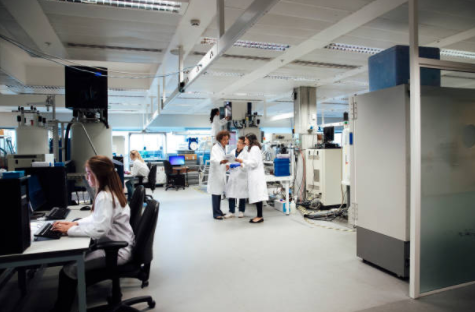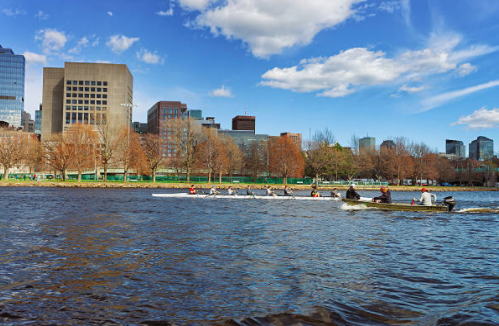Boston Lab Space
Boston City Properties is a leader in the Boston area commercial real estate market and can help pinpoint and negotiate the best lab possible for your company. We can connect you with one of our skilled tenant reps to secure a space. Search below to view current listings in the Boston area.
About the Current Market
In Boston and other cities around the country, offices might sit empty because of the decrease in demand. More companies are allowing employees to work from home. The coronavirus has caused a large portion of Boston's residential and commercial real estate market to plummet. For the first time in years, landlords must scramble to fill spaces as vacancies increase.

Although the commercial office space market is suffering, a small niche within that market for lab space is quite the opposite. Ironically, the COVID-era has also created a demand for lab space in many cities. Therefore, some building owners are trading cubicles with lab machines.
Both big pharma and small startups dominate the laboratory space market. Currently, the talent pipeline with MIT and Harvard being global health leaders drives the demand for lab space in Boston. Massachusetts General Hospital, Boston's Children Hospital, Brigham and Women's Hospital, and Dana Farber Cancer Institute help fuel this growth. Developers are building large amounts of laboratory space because of the number of labs these institutions require.
Currently, the potential exists for larger companies to acquire small companies that previously grew organically. Because these smaller companies can compete for workforce talent, they have become more attractive to venture capitalists. These smaller companies can remain in places like Cambridge, where the rent would ordinarily be unaffordable because of the financing they receive from venture capitalists. Cambridge is a magnet for venture capital funding, followed only by California.
Therefore, plenty of life sciences supply is currently under construction. The lab market expects to grow by 55 percent to 32 million square feet by the year 2024. So, while the real estate market is still tight, the need for lab space is one of the few markets in the country that is building aggressively to meet growing demand.
Industry Future Prospects
Typically, research grants are the primary source of funding for medical and academic practitioners. In 2018 Boston received over 9 billion dollars in grants from the National Institute of Health. The funding went to the two research institutions, Brigham and Women's Hospital and Massachusetts General Hospital.

High demand for commercial real estate exists because of future research and development and employment opportunities. The Boston market is almost equal to that of the San Francisco and Peninsula, with over 21.8 million square feet of lab space.
Over the next two years, the lab space market could increase from 9.3 percent to an estimated 12 million square feet of lab space. The largest markets are Boston/Cambridge and in the San Francisco Peninsula. Both Boston and San Francisco will have about 21.8 million square feet of space.
The Soaring Demand for Lab Space
The three primary income sources in the life sciences industry are research and development, the National Institute of Health (NIH), Venture capital, and corporate research and development spending. Over the past ten years, Boston has experienced the most growth in the life science talent pool. Employment in the life sciences field has increased by 87.9 percent. In comparison, employment in the United States overall has increased by 14.4 percent.

Most people who work in the life sciences are in medical research, pharmaceutical, and biotech. These employees cannot do this type of work from home. Therefore, for them, the coronavirus pandemic has helped fuel competition for real estate to use as laboratories. This trend stands in stark contrast to the general softening of the commercial real estate market that is all but shut down. Companies are switching to providing remote services because of the COVID coronavirus.
In recent months, Bristol Myers Squibb, the pharmaceutical giant, announced it plans to occupy 360,000 square feet of space in Cambridge's upcoming building project. In nearby downtown Boston, another major biotech firm plans to lease over 260,000 square feet of space. Both deals confirm the activity occurring within the market that is attracting billions of dollars in institutional investment.
Boston Areas Seeing Growth in Lab Space
San Francisco Peninsula, San Diego, Suburban Maryland, Boston, and Seattle/Puget Sound are the five markets in the United States that account for 10 percent or more of the entire office space inventory. In Boston, where there is tremendous growth in the lab space market, several development projects in life sciences are underway. These building projects are sprouting up in different parts of Boston, including Allston, Charlestown, Somerville, Watertown, and the Seaport District.

Recently, the City Council placed a contentious affordable housing zoning change on hold in nearby Cambridge. However, many believe the possibility of getting the zoning change passed is not over yet. Unfortunately, a scandal involving alleged bribery at the city Zoning Board of Appeal could lead to significant changes in how the region's biggest municipality approves its zoning change requests.
Brookline Lab Space
Brookline is home to one of the largest medical centers in the country. Contact us for inventory in the Longwood Medical area.
Somerville
Somerville is soon to experience its most considerable zoning changes since 1990. In July, the Planning Board gave the stamp of approval for a 175,000 square-foot lab building at Prospect Street and Somerville Avenue. Union Square Station Associates (US2) is developing the project. According to US2, this project will be unique to Somerville.
The Union Square buildout will provide commercial space and 40 percent residential, with more than 3.5 acres of open space. The project, which will cost $1.5 billion, is expected to generate $11.3 million in annual tax revenue. The developers are building the project around a future stop on the extended Green Line.
Once the new building is complete, Union Square companies will have the lab space they need. Businesses located in Somerville and Cambridge will also benefit from this project.
Watertown
In Watertown, developers are planning a huge Arsenal Yards project. The plan is to sub out a residential building in favor of a 130-foot property for life sciences companies. The building, which is over eight stories, will exist on the southeastern section of the property facing the Charles River.
Boylston Properties and The Wilder Companies, the project's developers, state that the floor plates will run from 16,000 to 20,000 square feet. The project also includes a garage. Part of the planned project consists of a path to the Charles River and an adjacent public park. When the project is approved, the developers hope the building will be complete and open sometime in 2022. The anticipated timeline for the project is 18 months.
Another redevelopment project expected to open before the end of the year is a $400 million project in the Arsenal Mall in the East End of Watertown.
Seaport District
The Seaport District can expect to see a shift in the properties once slated for residential to commercial office property because of lab space demand. WS Development requested to change its 350 Summer Street residential project to office space.
According to the request, the developer wants to change almost 384,000 square feet of office space for research and development. Of that space, they are reserving 38,000 square feet for retail, restaurants, and entertainment.
WS Development appears to have a tenant for the building if the city approves the change to office use. The developer has leased 580,000 square feet of space to a Cambridge-based life science firm for their new headquarters. That company also wants to occupy space in the new 350 Summer building.
Allston
In Allston, a group of developers submitted a proposal to construct a three-story building containing over 600,000-square-foot of office and lab space. The project also includes plans for 40 residential units, retail space, and almost 2000 square feet of civic space. The proposal area consists of the 4.3 acres, which is the current Stadium Auto Body, and other properties.
The hub of the project will be the Allston Innovation Corridor. Once the project is complete, it will essentially be a new neighborhood located next to Harvard's big 36-acre satellite campus in Allston.
The prices for Boston's office space is dropping because of an exodus of renters due to the coronavirus. However, lab space for companies needing to research in on the rise.
It's no secret that the number of spaces downtown is more than it was in the past two decades.
Part of what's driving the vacancies is the fact that companies have employees working from home. Therefore, they don't need to pay for office space they are not using.
As coronavirus shutdowns endured and cases spiked in some areas of the country, according to Boston-based CoStar Group, which monitors and identifies trends in real estate.
Many companies have placed their office space on the market because of employees' vacant spaces created due to working from home.
A total of 900,000 square feet of companies have become available for sublease since March 31.
The two primary reasons for the vacancies are from companies moving downtown and the pandemic.
Approximately 500,000 square feet of office space at 1 Lincoln Street will become vacant when State Street moves into their new 506,000 square foot office at 1 Congress Street.
The Financial District, East Cambridge, Back Bay, Kendall Square, and the Seaport District are seeing the largest spikes. These large corporate neighbors are the most expensive areas. They comprise of about 3.5 million square feet of office space.
Converting Properties into Lab Space
If you have a property in areas where the life sciences are thriving, converting empty offices to labs can make sense. Keep in mind that these renovation projects for lab space are not simple. The amount of floor height is one of the requirements office space renovators must consider. The ceilings in labs are usually about 15 feet because of the extensive ductwork and space needed to run vents, water lines, and HVAC systems required for research. Labs also require a large amount of space to be set aside for specialized machines used in their processes. Another central area of consideration is the foundation must be solid to protect against vibration. If a site does not meet these requirements, it could cause significant zoning and building code issues.
Because of the employee makeup, labs also need amenities similar to those provided at other Millennial-friendly startup offices. Because companies wish to be successful, they pay attention to their perks to attract the best talent.
Where to Buy or Lease in the Boston Area
If your company is in the market for lab space in the Boston area, our company is here to assist you. We have a team of knowledgeable professionals about the market, its trends, and the industry's requirements.